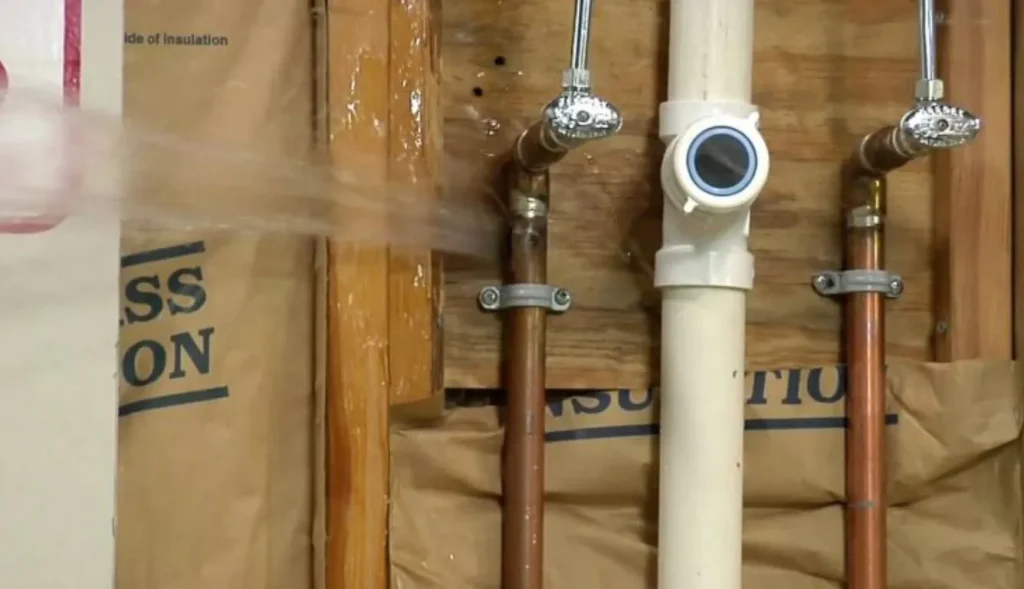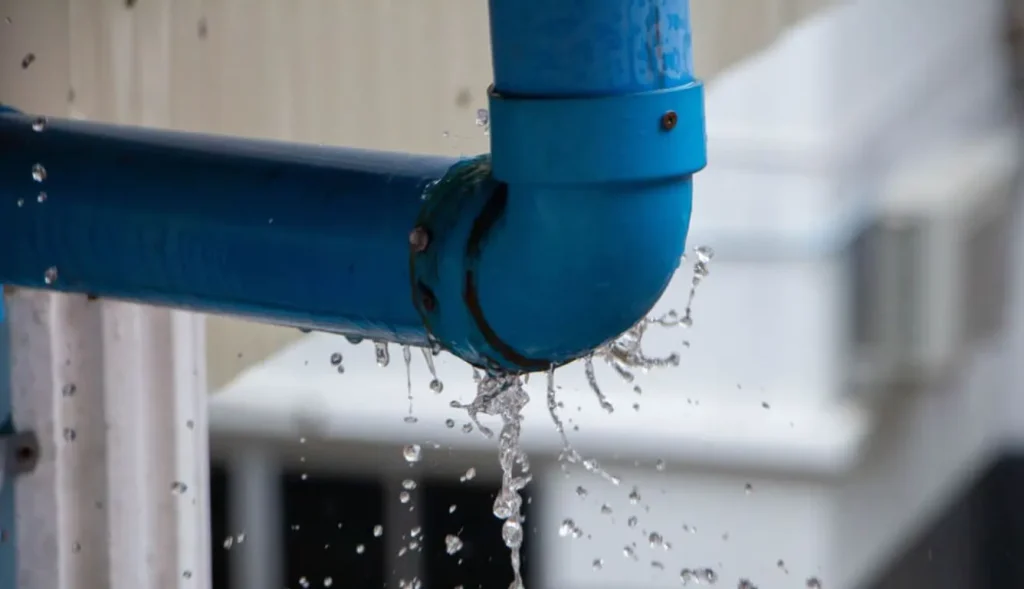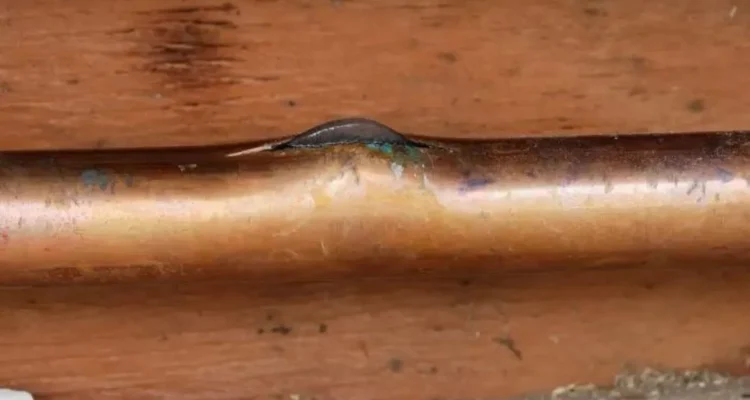When a pipe bursts in your home, it can cause significant damage, both to the structure of your house and your wallet. Knowing the signs of a burst pipe and what to do when it happens can help you minimize the damage and handle the situation like a pro.
Let’s dive into everything you need to know about burst pipes—how to identify them, what causes them, and the steps you should take if you suspect a pipe has burst.

What Is a Burst Pipe?
A burst pipe occurs when a water pipe in your plumbing system cracks, splits, or completely ruptures, allowing water to leak out uncontrollably. This can happen for several reasons, but the result is the same—uncontrolled water flow that can damage your walls, floors, and personal belongings.
Common Causes of Burst Pipes
Frozen Pipes
One of the most common reasons for a pipe to burst is freezing. When water inside the pipe freezes, it expands, causing the pipe to crack or burst. This usually happens during winter months when pipes are not properly insulated.
Corrosion and Aging
As pipes age, they become more susceptible to corrosion. Rust and buildup weaken the pipe’s structure, making it prone to bursting under pressure.
High Water Pressure
Water pressure that is too high can put excessive stress on your plumbing, leading to burst pipes. Over time, the constant strain can cause weak points in your pipes to fail.
Clogged Pipes
If a pipe becomes clogged and the blockage causes water to back up, the pressure can build up to the point where the pipe bursts.
Shifting Ground or Construction
External factors such as construction nearby or ground shifting (due to natural events or building) can put stress on underground pipes, causing them to crack or rupture.
Signs Your Pipe May Have Burst
Unexplained Water Puddles
If you see random puddles of water around your home—especially near walls or ceilings—it could be a sign that a pipe has burst and is leaking water.
Decreased Water Pressure
A sudden drop in water pressure, especially if isolated to one area of the house, is a potential sign that there is a leak or burst in the pipe system.
Sudden Spike in Water Bills
If your water bill jumps unexpectedly without a change in your water usage, it’s often due to a hidden leak or burst pipe wasting water.
Strange Sounds Coming from Pipes
Hearing gurgling, banging, or whistling noises when you turn on the faucet or flush the toilet can indicate a burst or damaged pipe.
Visible Water Damage on Walls or Ceiling
Water stains, damp patches, or peeling paint can indicate a pipe has burst behind the wall or ceiling.
Musty or Damp Odor
A persistent musty smell could be a sign of a slow leak or burst pipe, leading to mold and mildew buildup.
How to Confirm a Burst Pipe
Turn Off the Water Supply
To avoid further damage, the first step is to turn off the main water supply to your home. This stops water from continuing to flow out of the damaged pipe.
Check for Visible Leaks
Inspect the area around your plumbing fixtures for visible signs of water leakage. Pay attention to basements, crawl spaces, and attics where pipes are usually located.
Monitor Your Water Meter
After turning off all the water in your home, check your water meter. If it’s still moving, you likely have a leak or burst pipe.
Inspect the Water Pressure
If the water pressure is unusually low across multiple faucets, it’s a sign there could be a serious leak somewhere in the system.
Immediate Steps to Take If a Pipe Has Burst
Turn Off the Main Water Valve
Locate and shut off your main water valve to prevent more water from escaping the burst pipe.
Drain the System
Turn on all your faucets to drain any remaining water in the system. This helps prevent additional flooding.
Call a Professional Plumber
While it may be tempting to try a DIY fix, burst pipes often require professional attention to ensure the problem is properly addressed.
Clean Up Water Damage
Use towels, mops, and a wet/dry vacuum to clean up as much water as possible. The faster you act, the less chance water has to cause further damage.
Long-Term Prevention Tips for Avoiding Burst Pipes
Insulate Pipes Properly
Insulating your pipes, especially in colder areas of your home, can help prevent freezing and bursting during the winter.
Maintain Consistent Heating
Keep your home heated to at least 55°F, even when you’re away, to prevent freezing in the pipes.
Check Water Pressure Regularly
Use a pressure gauge to ensure your water pressure is within the recommended range (usually between 40-60 psi). Installing a pressure regulator can also help.
Address Leaks and Corrosion Early
Regular maintenance is key. Fix leaks promptly and replace corroded pipes before they become bigger problems.
How to Minimize Damage Before the Plumber Arrives
Use Temporary Fixes
Applying pipe tape or clamps can help temporarily stop the leak until professional help arrives.
Keep Track of the Situation
Monitor the burst pipe area to ensure no further damage occurs while waiting for the plumber.
Document the Damage
Take photos of the water damage for insurance purposes. This documentation can help if you file a claim later.
Can Burst Pipes Be Covered by Insurance?
In many cases, homeowners insurance will cover damage from burst pipes, but it’s essential to check your policy. Burst pipes due to lack of maintenance may not be covered, but sudden and accidental bursts often are.
How to Prevent Pipes from Freezing in Winter
Leave Faucets Dripping
Allowing a small trickle of water can prevent pipes from freezing since moving water is less likely to freeze.
Open Cabinet Doors
Opening cabinet doors under sinks allows warm air to circulate around the pipes, reducing the chance of freezing.
Use Heating Tape
Apply electrical heating tape directly to pipes that are at risk of freezing.
Why You Should Act Quickly on a Burst Pipe
A burst pipe can quickly cause widespread damage to your home. Mold, structural damage, and electrical hazards are just a few of the risks that come with ignoring the problem.
How Much Does It Cost to Repair a Burst Pipe?
The cost to repair a burst pipe can range from $200 to $1,500, depending on the extent of the damage and location of the pipe. This estimate doesn’t include water damage repairs, which can add significantly to the bill.
FAQs
1. How long does it take to fix a burst pipe?
The time it takes depends on the severity of the damage. Minor fixes may take a couple of hours, while extensive repairs could take days.
2. Can I fix a burst pipe myself?
While small leaks can sometimes be managed with temporary fixes, it’s best to call a professional plumber to ensure the problem is resolved safely.
3. Are burst pipes more common in winter?
Yes, frozen pipes are a leading cause of burst pipes during winter months.
4. What is the most common sign of a burst pipe?
Unexplained water puddles and decreased water pressure are two of the most common signs.
5. Can a burst pipe cause mold?
Yes, the moisture from a burst pipe can lead to mold growth if not cleaned up quickly.

Conclusion
A burst pipe is a homeowner’s nightmare, but being able to identify the signs early can save you a lot of hassle. Act quickly by turning off the water, calling a plumber, and taking steps to minimize damage. Regular maintenance, such as insulating pipes and checking water pressure, can also go a long way in preventing this from happening in the first place.


[…] For more detailed information on identifying and handling burst pipes, visit this burst pipes warning signs and response guide. […]